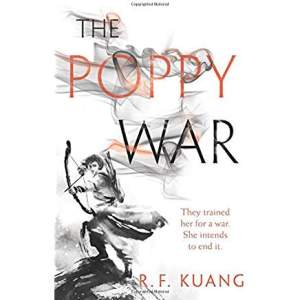 By R.F. Kuang
By R.F. Kuang
Harper Voyager, ISBN: 0062662562
Paperback, 549 pages. © 2018
Rather than be married off by her opium-dealing stepmother, war orphan Fang Runin (Rin) studies for—and passes—the Keju, an empire-wide exam known to identify the most promising youths, and secure her place at the prestigious Sinegard Academy, a military school filled with the rich offspring of nobles and warlords. Despite the bullying from classmates and instructors alike, Rin succeeds beyond anyone’s expectations and discovers within herself a power she never knew she had.
Through her training with a discounted Master on campus, Rin hones her ability and learns that the gods aren’t just stories. They’re real. One of them has chosen her. As the country is plunged into war and students from the Academies are drafted into service. Rin learns not only the true nature of her role as a warrior, but the heavy price of calling down the power of the gods.
The Poppy War is R. F. Kuang’s debut novel, and what a fabulous start! This ambitious military epic wraps the horrors of war into the cloak of fantasy, which only sharpens the edges of cruelty like a honed blade. Settings are gritty, realistic. I could smell the peppercorns and hear the vendors’ cries in the markets, feel the mud sucking at my shoes, taste the bland gruel. In the Khurdalain scenes, I could see the maze of narrow back alleys, smell the brine and the fish from the waterfront. In the Academy scenes, I could see the differing levels and the pagodas with their curled roofs and icy steps. And the scenes in Golyn Niis—well. You need to read it for yourself to see those.
Characters, too, came across in clear imagery. Each one’s personality shone distinct from the others, and they all worked well together for the narrative, even when they were fighting. Especially when they were fighting. Rin’s trials and accomplishments ring true, as do her self-doubts and little lies aimed at achieving her personal goals. Most of the story is told from Rin’s point of view, but the reader gets an apt feeling for the other characters as well.
As a refreshing change from the more common fantasies I’ve read where Western concepts rule, there is a distinct Eastern flavor to every element in this story. Unsurprising, since Kuang’s BA in International History focused in part on Chinese military strategy. She wrote her thesis on the 1937 Rape of Nanjing, so she knows her subject inside and out. In fact, that’s what The Poppy War is based on, so even though Rin and many of the other characters are in their teens, this is no Young Adult fantasy. As a student of history, Kuang paints brutality in bold colors and holds it up for examination by the reader. Violence, cruelty, murder, rape, genocide, mutilation, torture, human experimentation, all the grotesqueries of war hold space in these pages. Kuang’s own blog warns that if you are triggered by these things, you should not read the book.
But as the author points out, healing only comes from honest analysis of the past. She didn’t want to gloss over these atrocities, hide them behind curtains where no one would think of them again. She wanted to wave them like a banner so that we would never forget. I can say with confidence that she has succeeded in that goal. Because she did such a good job at depicting all the scenes, those most likely to give nightmares will not dissipate easily or quickly. And that’s exactly the point.
The Poppy War is the first book in a trilogy. It was only released earlier this year, so I’m not sure when the next book is due out. It is a riveting, enthralling, edge-of-your-seat ride, but it is not an easy read. Even so, I highly recommend it for those who can face painful truths and an in-your-face tale.
